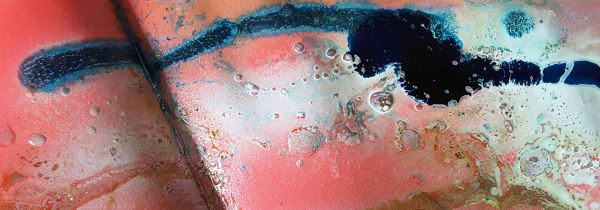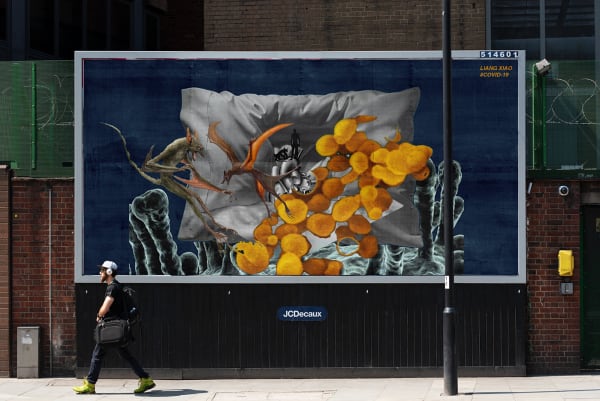Graduating from MA Art and Science, Liang Xiao talks to us about her final project Narrative: COVID-19 from Wuhan to London. Through performance, video, installation and photography, she documents her experiences of the coronavirus outbreak in both her hometown of Wuhan and the UK.
Tell us about your final project and why you chose that subject.
"My final project was born around COVID-19. As a Hubei native based in London, I faced the outbreak both in my hometown of Wuhan and in Britain. After the outbreak, I changed my research to focus on COVID-19, using daily reports from my friends and family during lockdown in Wuhan and my self-isolation experiences in London to inform the four works I presented for the Graduate Showcase.
I wanted to explore the connections between the outside world and individuals – the public and private experiences of living through a pandemic. I tracked the root of the virus and its spread by reading academic papers; I sought feedback from the outside world through my work; and asked about the impact of this crisis. Given the limitations of working on my own in a small room, the videos I produced were shot on the tiny balcony outside my room through an access window. I also made a book of photographs, a light installation and a series of posters from the confines of my room during lockdown."
Balcony Utopia
Performance, 2020
"The infectiousness of COVID-19 can cause people to panic about their bodies being exposed to the outside air. The balcony sits somewhere between the dangerous outside world and the indoors – which represents a sense of security. By studying the political, functional and symbolic history of balconies in different periods, I found that its architectural form is the epitome of its relevant era and society. The semi-public and semi-private balconies can also be part of everyday life or a stage; it is the connection between an individual and the world. For Balcony Utopia, I performed on the balcony, using the art of the apartment and household objects to show the conflict and dialogue between private and public spaces, self-help and communication with the outside world."
556 Holloway Road
Photobook, 2020
"This book records the state of self-isolation in London during the lockdown period. It is an exploration of extreme social forms and the mutual compromise between individuals and society, objects and the world. It was created between March and May 2020, when most people began to isolate at home. The title of the book is my address in London. The special binding design in this book turns windows into symbols of communication."
How did coronavirus and the lockdown impact your practice?
"The first impact of the pandemic on my practice was that it became the focus on my final project. When COVID-19 broke out in China, Chinese factories went on strike, so my original project could not be realised in the UK. Instead, my Hubei identity made me turn my attention to the study of the pandemic.
In addition, I really gave up the pursuit of technical presentation in my works without sufficient technological conditions. Especially after lockdown was introduced in London, my sense of crisis prevented me from going out.
Self-isolation makes the fantasy of technicality disappear; the limited creative conditions allowed me to see a pure self. Now, I am talking to the world in my own way."
Do you think you will continue to explore these themes in your work that have arisen from COVID-19?
"Even if the virus disappears, society will still be plagued by the consequences of the crisis. At present, my recent research is still focused on the post-epidemic era in China. I have been combining the life experience of the masses with scientific research to try new practices. I hope to contribute my skills and energy as an artist in a productive way, when society is facing such a huge crisis."
Psychedelic, Stay away from me
Light interactive installation, 2020
Moving forward, what changes do you hope to see in the future of your discipline and the creative industries?
"I hope that, in the future, industries set up cross-professional programmes which can help artists work better within scientific disciplines. From traditional subjects to emerging technologies, some artists are interested in technological innovation, but they are limited to their academic background. Unfortunately, when seeking the co-operation of scientists, artists can often encounter various difficulties. It would be good to see more official routes for this sort of collaboration."
What does it mean to you to be part of the “Class of 2020”
"I feel sad that my two years of study ended so soon. In 2020, it seems like time has accelerated from the first day of the new year to the present – especially now when I think back to my days of self-quarantine. At the time, I felt that every day was particularly long, but now it seems as though those days have been compressed. Time has moved very strangely; it’s just a pity that we could not have our typical degree show and graduation ceremony."
Thinking about your fellow students, whose work would you recommend and why?
Phil Barton – as an eco-artist he has an interprofessional background. His practice is focused on collaboration and engagement, with communities, scientists, fellow artists and with nature.
When the epidemic broke out, he had to return to Manchester. In the absence of a workshop, although he was frustrated, he did not stop creating. He used the materials in his home to paint and to collage. He also edited videos, discussed with others online and organised seminars. I received a lot of encouragement from him. I realised from his dedicated research and rigorous academic attitude that this is the essential quality of an artist. There are many such artists on our course, and I have learned a lot with them in the past two years.
What is next for you?
I will apply for a PhD course based on my research and return to London. In the future, I hope to be an educator and independent artist – sharing my understanding of the world to my students, while continuing to shape myself, and hope that I can bring some good influences to others and society.
Liang Xiao is nominated for this year's MullenLowe NOVA Awards. Explore the full list of nominees.
More:
-

Maria Macc, Maria Macc
-

Liang Xiao, MA Art and Science
Narrative: COVID-19 from Wuhan to London, 2020


